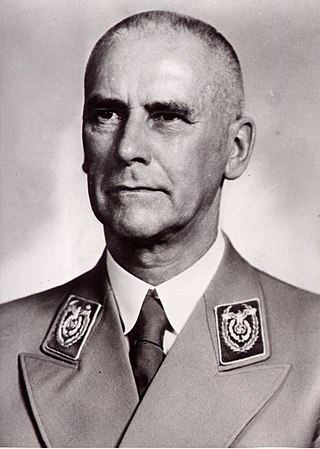
Hermann Wilhelm Göring was a German politician, military leader, and convicted war criminal. He was one of the most powerful figures in the Nazi Party, which governed Germany from 1933 to 1945.

Wilhelm Frick was a convicted war criminal and prominent German politician of the Nazi Party (NSDAP) who served as Minister of the Interior in Adolf Hitler's cabinet from 1933 to 1943 and as the last governor of the Protectorate of Bohemia and Moravia.

The Reichstag Fire Decree is the common name of the Decree of the Reich President for the Protection of People and State issued by German President Paul von Hindenburg on the advice of Chancellor Adolf Hitler on 28 February 1933 in immediate response to the Reichstag fire. The decree nullified many of the key civil liberties of German citizens. With the Nazis in powerful positions in the German government, the decree was used as the legal basis for the imprisonment of anyone considered to be opponents of the Nazis, and to suppress publications not considered "friendly" to the Nazi cause. The decree is considered by historians as one of the key steps in the establishment of a one-party Nazi state in Germany.

The Enabling Act of 1933, officially titled Gesetz zur Behebung der Not von Volk und Reich, was a law that gave the German Cabinet – most importantly, the Chancellor – the power to make and enforce laws without the involvement of the Reichstag or Weimar President Paul von Hindenburg, leading to the rise of Nazi Germany. Critically, the Enabling Act allowed the Chancellor to bypass the system of checks and balances in the government.
The German Democratic Party was a liberal political party in the Weimar Republic, considered centrist or centre-left. Along with the right-liberal German People's Party, it represented political liberalism in Germany between 1918 and 1933. It was formed in 1918 from the Progressive People's Party and the liberal wing of the National Liberal Party, both of which had been active in the German Empire.

Kurt Ferdinand Friedrich Hermann von Schleicher was a German military officer and the penultimate chancellor of Germany during the Weimar Republic. A rival for power with Adolf Hitler, Schleicher was murdered by Hitler's Schutzstaffel during the Night of the Long Knives in 1934.

The president of Germany was the head of state under the Weimar Constitution, which was officially in force from 1919 to 1945, encompassing the periods of the Weimar Republic and Nazi Germany.

Wilhelm Marx was a German judge, politician and member of the Catholic Centre Party. During the Weimar Republic he was the chancellor of Germany twice, from 1923 to 1925 and from 1926 to 1928, and served briefly as the minister president of Prussia in 1925. With a total of 3 years and 73 days, he was the longest-serving chancellor during the Weimar Republic.
The early timeline of Nazism begins with its origins and continues until Hitler's rise to power.

The Hitler cabinet was the government of Nazi Germany between 30 January 1933 and 30 April 1945 upon the appointment of Adolf Hitler as Chancellor of Germany by President Paul von Hindenburg. It was contrived by the national conservative politician Franz von Papen, who reserved the office of the Vice-Chancellor for himself. Originally, Hitler's first cabinet was called the Reich Cabinet of National Salvation, which was a coalition of the Nazi Party (NSDAP) and the national conservative German National People's Party (DNVP). The Hitler cabinet lasted until his suicide during the defeat of Nazi Germany. Hitler's cabinet was succeeded by the short-lived Goebbels cabinet, with Karl Dönitz appointed by Hitler as the new Reichspräsident.

Federal elections were held in Germany on 5 March 1933, after the Nazi seizure of power on 30 January and just six days after the Reichstag fire. The election saw Nazi stormtroopers unleash a widespread campaign of violence against the Communist Party (KPD), left-wingers, trade unionists, the Social Democratic Party and the Centre Party. They were the last multi-party elections in a united Germany until 1990.

Hermann Eduard Johannes Popitz was a Prussian lawyer, finance minister and a member of the German Resistance against the government of Nazi Germany. He was the father of Heinrich Popitz, an important German sociologist.

The government of Nazi Germany was a totalitarian dictatorship governed by Adolf Hitler and the Nazi Party according to the Führerprinzip. Nazi Germany was established in January 1933 with the appointment of Adolf Hitler as Chancellor of Germany, followed by suspension of basic rights with the Reichstag Fire Decree and the Enabling Act which gave Hitler's regime the power to pass and enforce laws without the involvement of the Reichstag or German president, and de facto ended with Germany's surrender in World War II on 8 May 1945 and de jure ended with the Berlin Declaration on 5 June 1945.

Walter Friedrich Julius Köhler was a German Nazi Party politician who served as the Minister President of Baden in Nazi Germany from 1933 to 1945.
Werner Willikens was a German politician with the Nazi Party who largely served in agricultural administration. He was also a general officer in the SS. His phrase "working towards the Führer", which he used in a 1934 speech, has become a common description of Nazi bureaucracy.

The Papen cabinet, headed by the independent Franz von Papen, was the nineteenth government of the Weimar Republic. It took office on 1 June 1932 when it replaced the second Brüning cabinet, which had resigned the same day after it lost the confidence of President Paul von Hindenburg.

The Reich Ministry of Food and Agriculture was responsible for the agricultural policy of Germany during the Weimar Republic from 1919 to 1933 and during the Nazi dictatorship of the Third Reich from 1933 to 1945. It was headed by a Reichsminister under whom a state secretary served. On 1 January 1935, the ministry merged with the Prussian Ministry of Agriculture, Domains and Forests, founded in 1879. Until 1938 and the Anschluss with Austria, it was called the "Reich and Prussian Ministry of Food and Agriculture". After the end of National Socialism in 1945 and of the Allied occupation of Germany, the Federal Ministry of Food and Agriculture was established in 1949 as a successor in the Federal Republic of Germany.

Robert von Keudell was a German diplomat, politician and music lover.
The Provisional Law and Second Law on the Coordination of the States with the Reich were two laws enacted by the German government of Adolf Hitler to expand its control over the seventeen German states (länder). The Provisional (First) Law dissolved all the sitting landtage, except for that of Prussia, and reconstituted them in accordance with the results of the recent parliamentary election of 5 March 1933, which had given the Nazi Party and its coalition partner, the German National People's Party (DNVP), a majority of the Reichstag seats. The Second Law established the new powerful position of Reichsstatthalter appointed by the central government to effectively take control of each state administration. The effect of these laws was to undermine the power and influence of all political parties other than the Nazis and the DNVP, and to move Germany significantly away from being a federal republic and put it on a path to becoming a unitary state.














